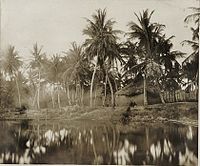
Photo from wikipedia
Abstract This paper discusses the impacts of Climate Change and anthropogenic activities on coastal lagoons in Ghana. Ghana’s coastal lagoons provide unique ecosystem services. However, they are highly fragile and… Click to show full abstract
Abstract This paper discusses the impacts of Climate Change and anthropogenic activities on coastal lagoons in Ghana. Ghana’s coastal lagoons provide unique ecosystem services. However, they are highly fragile and vulnerable to natural processes and anthropogenic activities. Climate Change impacts, such as increased temperatures, sea-level rise, storm surge and increased precipitation are likely to have ecological damage to lagoon ecosystems as a result of erosion, submergence of lagoon barriers, flooding and drying of the surrounding wetlands. Field observation, Geographic Information System modeling were among the methodology applied. The paper identified that anthropogenic activities and Climate Change would combine to have a serious future impact on lagoon ecosystems. Particularly, increased rainfall-induced flooding from the hinterland may be very injurious to the lagoon ecosystem, since the flood water may carry not only nutrients but also various contaminants and solid plastic waste generated by human activities around lagoons catchment into the lagoon channels. Besides, due to the barriers across most lagoon inlets, such polluted runoff water may not be able to flush out to sea, thus impacting negatively on the water quality of the lagoons. The paper proposes some adaptation strategies and recommends the early implementation of Climate Change adaptation strategies, coastal lagoon management measures to prevent potential future destructive impacts.
Journal Title: Coastal Management
Year Published: 2020
Link to full text (if available)
Share on Social Media: Sign Up to like & get
recommendations!